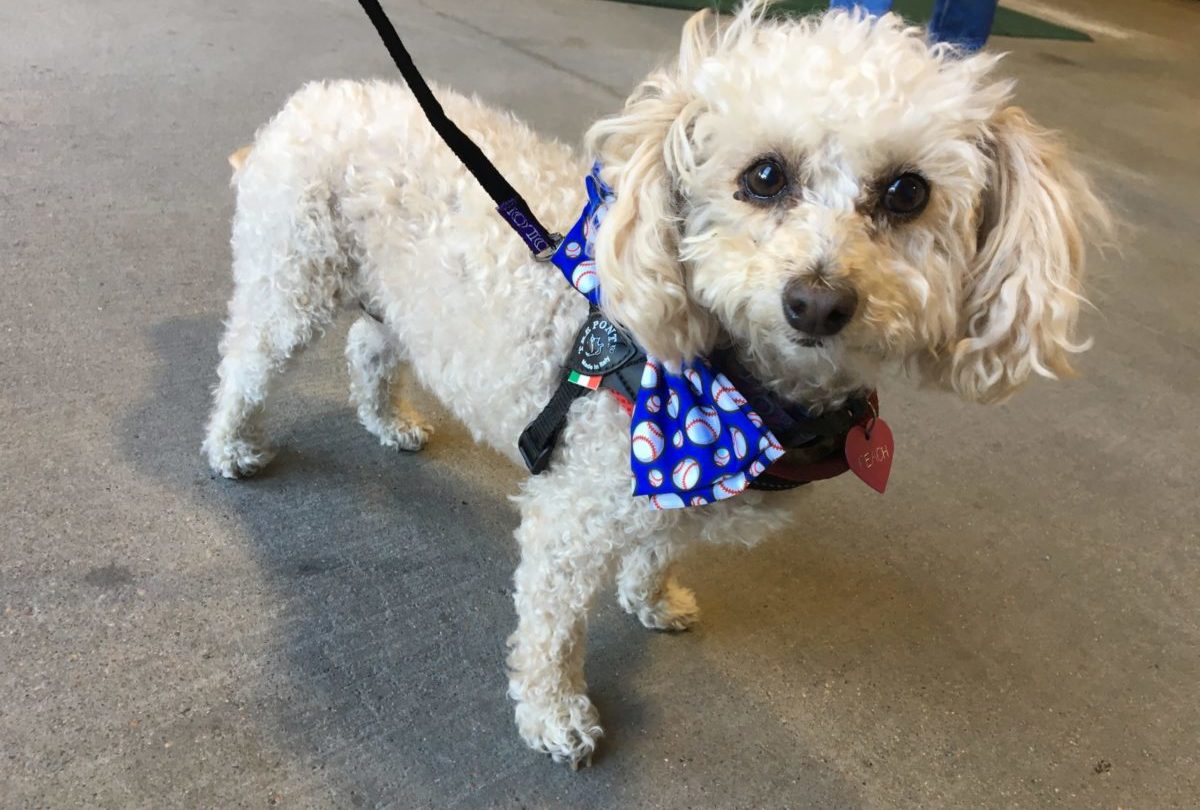After my husband and I adopted a little stray Poodle named Peach, we took her to the veterinarian for a checkup. We were shocked when we learned she was overweight at 10.2 pounds.
“She’s been hiking with us. Maybe muscle weighs more than fat?” I ventured.
Our veterinarian patiently but firmly said, “No, she needs to be under 9 pounds to be a healthy weight.”
It can be challenging for pet lovers to recognize when their dog or cat is overweight or obese because so many animals in America are, says Natalie Marks, DVM, CVJ, Fear Free certified veterinarian, and medical director of Blum Animal Hospital in Chicago, Illinois.
“The media portrayal of a ‘cute’ or ‘adorable’ cat is that classic picture of Garfield or another big orange tabby cat with this huge belly,” she said. “In reality that’s a pretty obese cat.”
The issue has been compounded by stay-at-home orders during the coronavirus pandemic while many of us are home, feeding our pets extra treats.
“Humans are stress eating, and I think we’re projecting that onto our pets a bit,” Dr. Marks said. “One of the few things that’s providing a lot of joy right now is food.”
It’s just as important for pets to maintain a healthy weight as it is for us. In fact, a major study of over 50,000 North American dogs found those with a healthy weight live up to 2.5 years longer than overweight ones.
“If we can have two extra quality years, to me, that is a huge win and a reason itself to keep them at ideal body condition scores,” she said.
In addition to affecting overall longevity, dogs that are overweight are at risk of health issues like diabetes, high blood pressure, heart disease, Cushing’s disease and orthopedic issues like arthritis and tears in their knees and elbows.
“Prevention is always the best medicine,” Dr. Marks says.
So how can we tell if our pet needs to lose weight? Veterinarians evaluate each dog or cat’s weight with body condition scoring, based on the pet’s frame, rather than breed. You can perform your own simple evaluation at home:
- Top view: When you stand above your dog or cat, you should see an hourglass figure with a slight indent past the last rib and curvature outward toward the hips.
- Side view: Your pet’s stomach should tuck up higher or closer to the body than your pet’s chest. “If it’s straight across, your dog or cat is over ideal weight.”
- Touch: You should be able to see and feel the very last rib on your dog or cat. “If we can feel or see all of them too easily, your dog or cat’s too thin. Most of the time, though, we have a harder time feeling those ribs. That means they’re over their ideal body condition score.”
If you suspect your dog is overweight or obese, talk to your veterinarian about ways to help them lose weight and then maintain a healthy body condition score. Dr. Marks says this is important because an underlying medical reason such as hypothyroidism could be causing weight issues.
She also recommends having one person in the household be responsible for feeding meals to ensure consistency, and using measuring cups. Treats should never constitute more than 10 percent of a pet’s daily food intake.
“Treats don’t need to be any bigger than the pinky fingernail on your hand,” she says. “That’s enough to create that happy endorphin response from your dog or cat.”
Exercise is crucial, too. Take dogs for walks – easing them into longer walks if they’ve been sedentary – and use a wand toy to engage your indoor cat. Because cats like to hunt for their food, hide it around the home instead of leaving it in a bowl.
“Hide it up high, in a cat tree, on top of a fridge, on a sill, behind a couch, in their carrier,” she suggests.
Ultimately, taking steps to help our pets maintain a healthy weight will make us all happier.
“If we can use good-quality nutrition and have pet parents continually judging their dog or cat’s body condition score, the longer we can keep those pets alive with a good quality of life.”
This article was reviewed/edited by board-certified veterinary behaviorist Dr. Kenneth Martin and/or veterinary technician specialist in behavior Debbie Martin, LVT.
Award-winning journalist Jen Reeder is former president of the Dog Writers Association of America.








